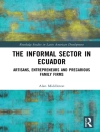Religion and development have been intertwined since development »s beginnings, yet faith-based aid and development agencies consistently fail to consider how their theology and practice intersect. This book offers a Christian theology of development, with practical solutions to bridge the gap and return to truly faith-based policies and practices.
Development aims to raise the living standard of the world’s poor, mainly through small-scale projects that increase economic growth. A theology of liberation provided a critique to development practice, but a specific theology of development is still lacking, and many faith-based aid agencies have failed to adapt their practice. In applying theological thinking to development, the author argues that aid agencies need to address the entrenchment of unequal power relations, and embrace a holistic notion of development, defined by the needs of those most marginalized, instead of by a focus on economic growth. Development organisations need to consider the distinction between charity and justice, and to empower people in the Global South, paying particular attention to the intersections of race, class, sexuality, religion, and the environment.
Overall this book is a powerful call to upend development practice as it currently exists and to return faith-based organizations to following Christian practices. It will be an important read for religion and development researchers, practitioners, and students.












